On Juneteenth, Lemel Durrah, owner and operator of Compton Vegan, hosted the Compton Vegan Cares Initiative in the midst of the Covid-19 pandemic. His plan was to feed the city of Compton directly and for free by donating two hundred plant-based meals, along with toilet paper, bottled water, face masks, and other miscellaneous essential goods.
In order to claim your items, all that was asked was to show anything that had your name on it along with your Compton address. But when one man arrived, he instead showed Durrah the top of his right hand, tattooed with “Sweet Home Compton” scripted above the city skyline. He was a part of the Compton community, and Compton was a part of him.
Durrah, a vegan soul food chef and health advocate, started Compton Vegan in order to provide healthier options to his home community, a city facing food apartheid, including the scarcity of food that is nutritionally valuable.
Durrah was born in Compton, and while he moved around as a child—living in places like Virginia, Germany and Texas—“Compton is home,” he says. After graduating from Tuskegee University in Alabama, he says, “I wanted to go back to my community and make a difference,” he continues. “I just wanted to be a better example.”
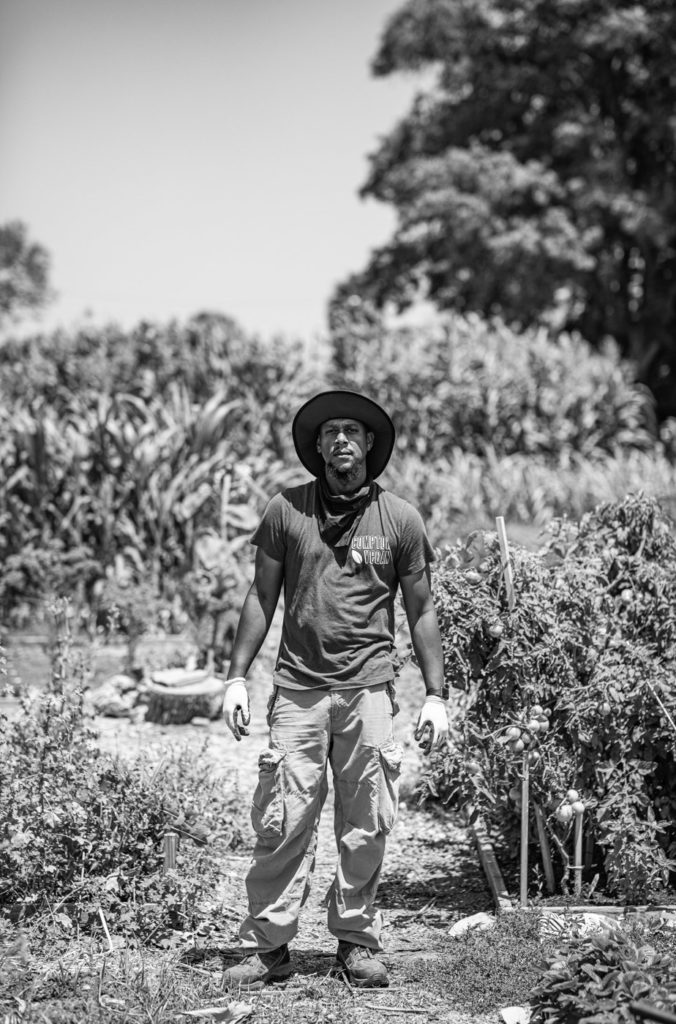
When he returned home from college, he became an educator and coached basketball. He then accepted an entry-level job at SpaceX with aspirations to advance within the company. While there, he listened to a Breakfast Club interview featuring Damon Dash—the famed entrepreneur, record executive, and producer—where he spoke of “being your own boss.” The interview deeply resonated with Durrah, shifting his perspective and trajectory.
But in 2014, in an effort toward personal recovery following a divorce, Durrah decided to try the Daniel Fast, a Biblical fast where no animals or animal products are consumed, typically done for twenty-one days at the start of a new year. According to the philosophy of the fast, everything eaten should come from the earth in an effort to cleanse you spiritually and physically.
During those three weeks, he reflected on who he wanted to be, and extended the fast to forty days. “At no point in time was I aiming to be one of those people who had subscribed to a particular diet,” Durrah says of veganism. “It was just me learning about things, and eliminating things.” This experience ultimately committed him to living a plant-based life. It was with that in mind that Durrah had the vision to help Compton access healthy, nutritious dietary options as well as be a role model for his community. Like David standing before Goliath, Durrah’s vision has him staring down a system of food injustice.
“My idea was to build a vegan restaurant in the city of Compton while giving back to my city still,” he says. “And trying to create generational wealth for the kids I don’t even have yet—the generation that’s coming next.” Durrah’s work is centered around an understanding that wealth cannot exist without health—that food is an investment into one’s future, and that of future generations too. That to eat well, is in itself, a form of social justice.
___
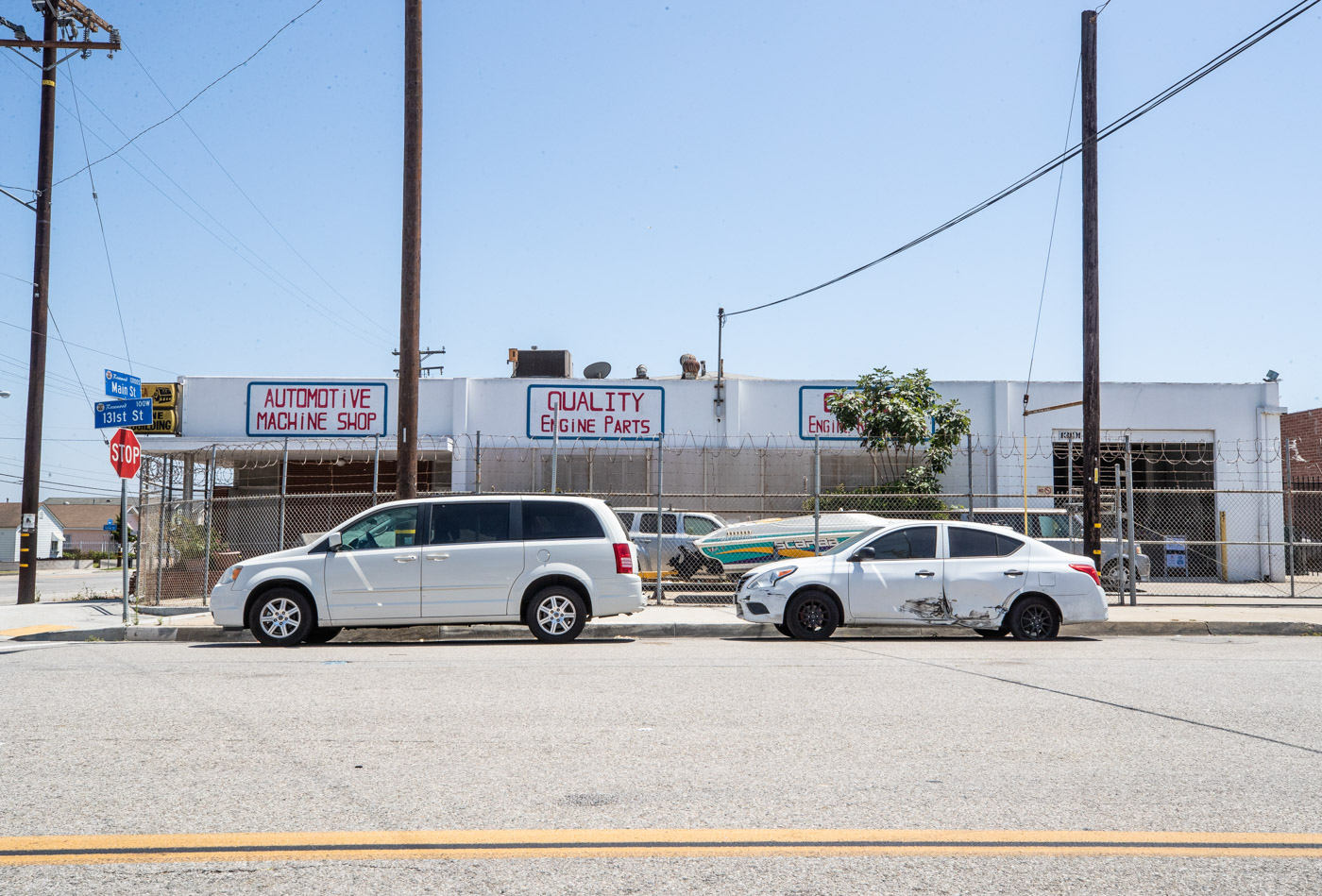
Originally inhabited by the Indigenous Tongva, and then ultimately colonized by the Spanish, Compton was then settled in 1867 after California’s Gold Rush era by a pioneering group led by Reverend Griffith Dickenson Compton. In fact, Compton is one of the oldest cities in all of California, and was the eighth overall city to incorporate in Los Angeles in 1888.
In order to incorporate, Compton donated his land and stipulated that certain acreage—an area known as Richland Farms—be zoned for agricultural purposes, which remains in effect today. Here, you could run a small homestead farm or ranch that included land for growing agriculture and raising livestock. During and after World War II, Black families, for example, began to migrate from the South to the West Coast, with many finding their new homes in this very locale and its neighboring suburbs, which reminded them of home along with new prospects of work.
Prior to World War II, Compton’s population was ninety-five percent white, and by 1965, Compton had become sixty-five percent African American. Its current population, according to a study by the Los Angeles County Department of Public Health, is predominately Latinx encompassing nearly sixty-seven percent of the population; the African American community now consists of around thirty-one percent of the local population.
Some of the original Black families to move to the area did so because of the Supreme Court’s 1948 ban on discriminatory housing restrictions. Subsequently, white families rapidly left the city in white flight due to the changing demographic; Compton’s population is now less than one percent white. Since the 1980s, this Los Angeles region has seen a major rise in the Latinx population as well—a shift partially due to rising emigration from conflict in Mexico along with civil wars in Central America, as well as the prospect of new job opportunities and affordable housing rates. This emigration coincided with an exodus of Black families due to civil unrest.
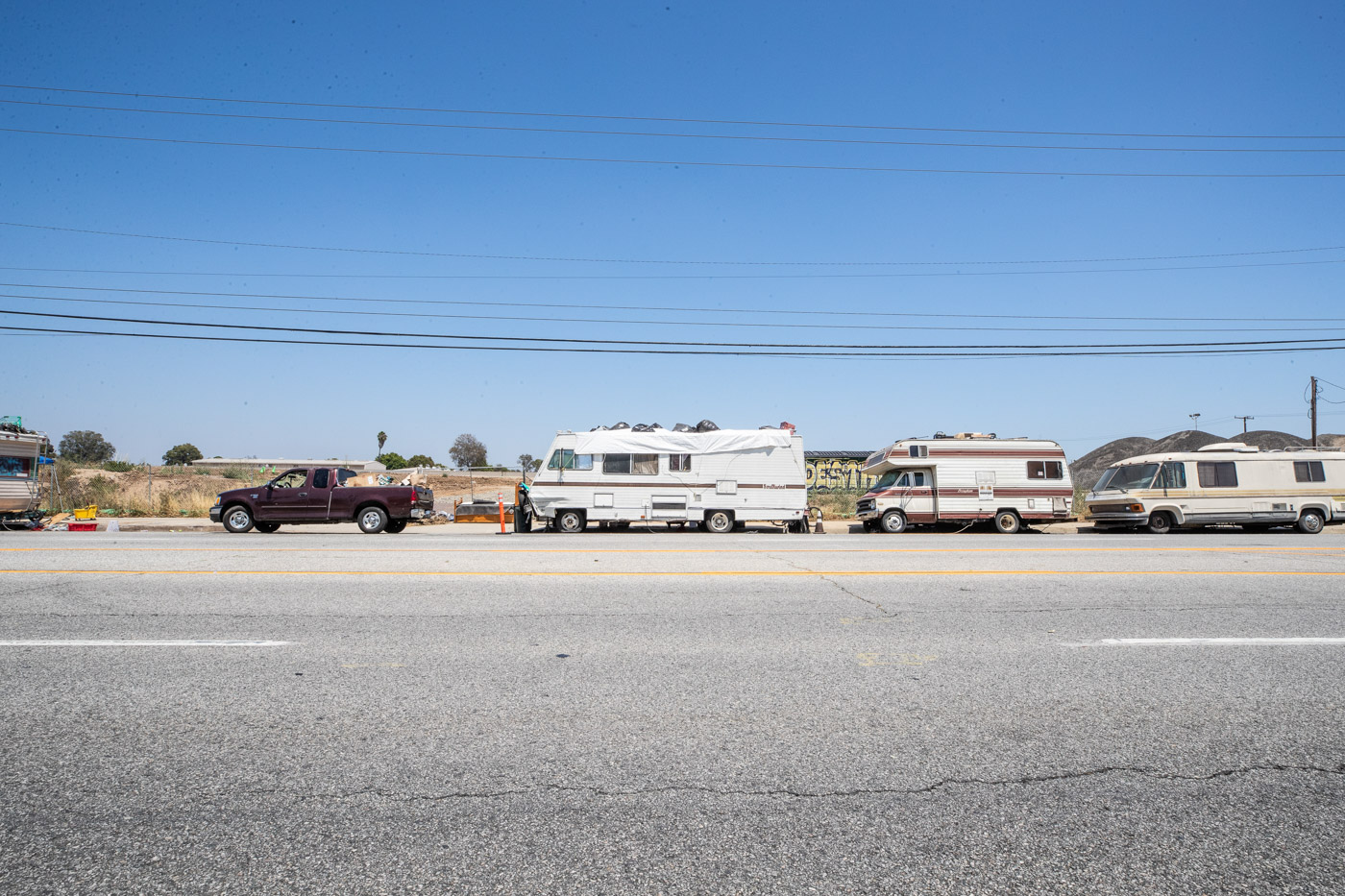
And while Compton is headquarters to such grocery giants as Ralphs and Food 4 Less, the city also faces food apartheid. The presence of an abundance of fast food restaurants, convenience stores, and liquor stores are all predictors of chronic health issues, such as obesity and type 2 diabetes, which disproportionately affect BIPOC populations.
Compton’s battle for accessible nutrition is an uphill one. For example, Los Angeles County’s Department of Public Health recently reported the percentage of adults who eat five or more servings of fruits and vegetables per day is only 12.7 percent. The gap between the culinary and dietary landscape as it stands and moving toward a more plant-based diet is wide, but those like Durrah are attempting to bridge it.
___
An integral facet of Durrah’s journey was recreating meals he used to eat and would crave. These familiar dishes—foods like Compton Vegan’s jackfruit ribz, mac n cheeze with buffalo chik’n, collard greens, shrimp, and cornbread—can serve as a gateway to a future less reliant on cheaply produced, factory farmed meats that are hard on the body and destructive to the environment. The hope is that when these plant-based options are healthier compared to the original, and just as good—if not better—you might begin to see a change in demand, and therefore a change in what’s provided.
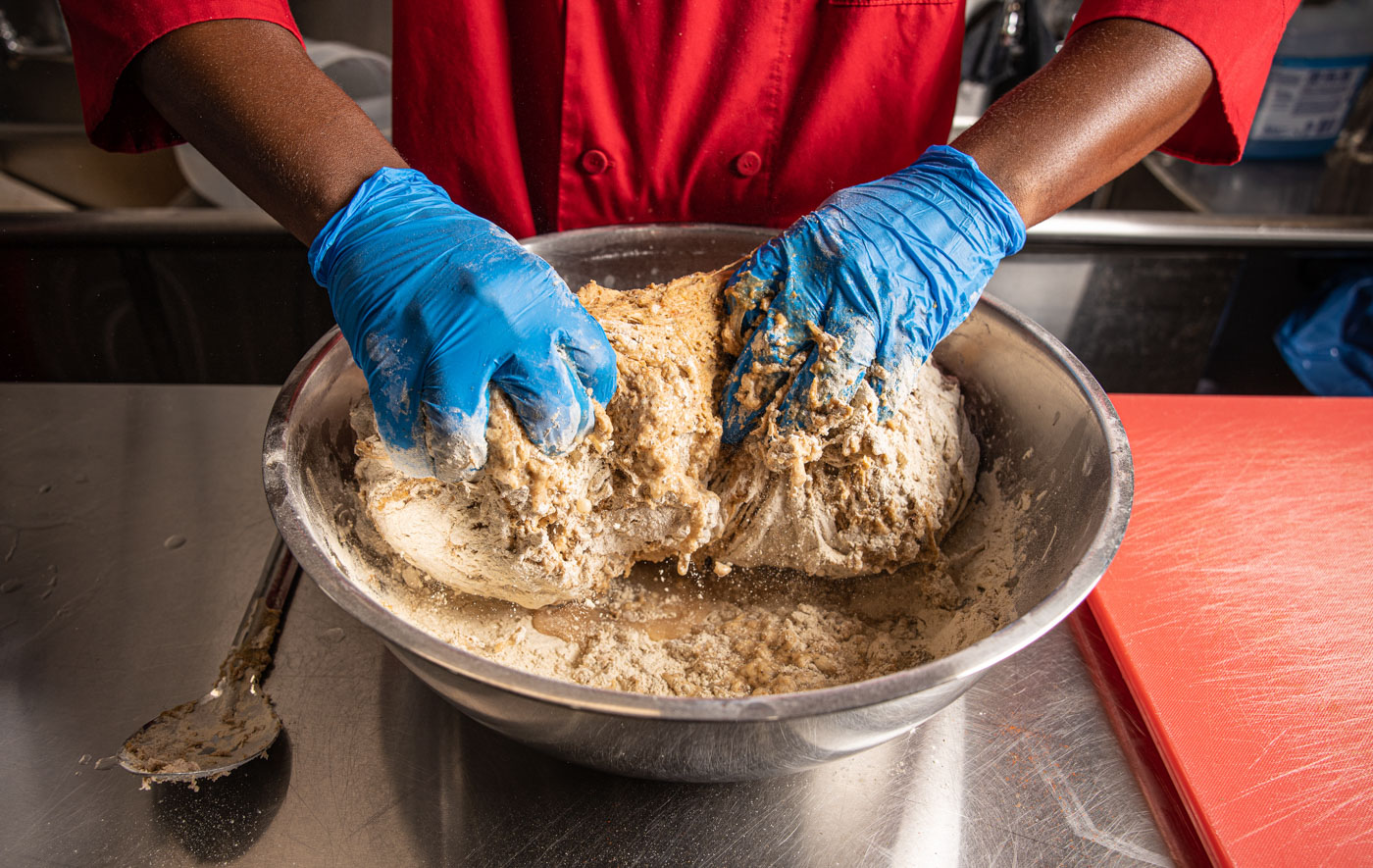
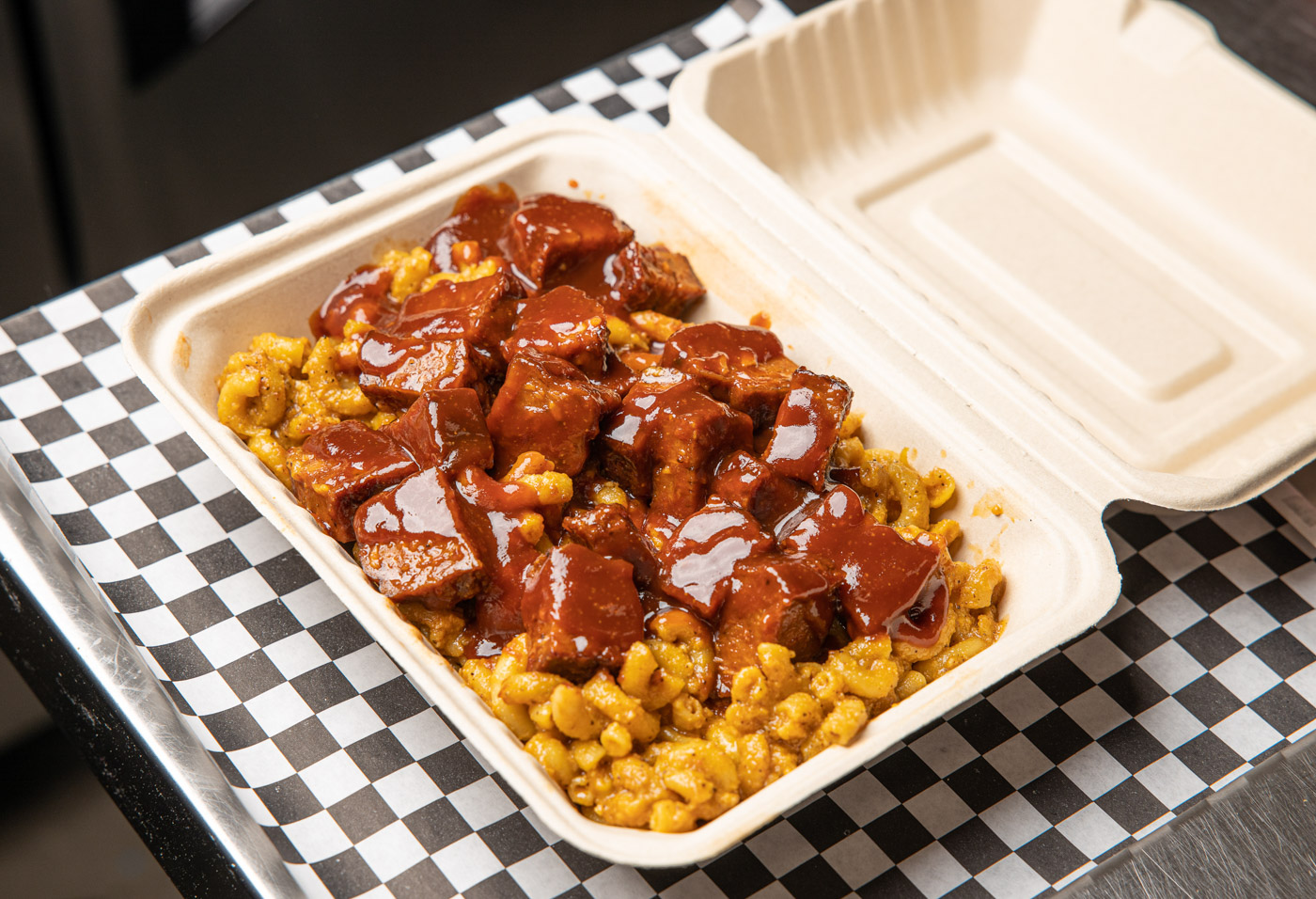
“What I’m trying to do is help a generation that doesn’t know that there are different ways to do things,” Durrah explains. “I want kids in Compton to say they grew up vegan. They never had a double heart attack with cheese from pick-a-fast-food-place. In the inner city, those are the only options that are available.”
When most of the options in your community that are accessible and affordable are also processed, high-fat, and fried foods, that’s simply what the population is likely to eat. “I’ve heard probably every response you can get,” Durrah says, referring to reasons people have provided for avoiding veganism, which range from upbringing, to religious beliefs, to flavor.
He always responds with, “Don’t knock it ‘til you try it,” or, “Don’t wait until the doctor tells you you have to.” It’s a daunting challenge, but to take control of your health through food is to begin to reclaim your autonomy in a system that is working against you.
When Durrah first started Compton Vegan, his goal was to create and provide an option that he didn’t have as a child—or as an adult. “I just want that to be what becomes contagious across the world, in a positive sense, to where now other people are requiring their communities have healthier options,” he explains of his goals. “I would love for there to be a Compton Vegan in every community, because I’m that option here for my people. I can be that option for any community.”
Durrah’s mission is to provide an alternative to the typical diet provided to Compton and similar cities. Because the easy accessibility to unhealthy foods, and the scarcity of foods that are beneficial for you, is critical in perpetuating habits of unwellness in generations—both present and future. Less than ten miles away is the city of Long Beach, for example. Around half of its population is white, and the city has an abundance of farmers markets, health food stores, and juice shops.
Los Angeles isn’t all green juice and sunshine. In fact, its soul is largely reflected in historic communities like Compton, where the lack of accessible health is active, systemic oppression that disproportionately affects its residents, who are almost entirely people of color. And this is the kind of system that has evolved in Compton, and inner cities throughout the country. But with the work of people like Durrah educating others on the potential benefits of the food you consume, there’s hope for sustained, constructive change toward building thriving communities.
___
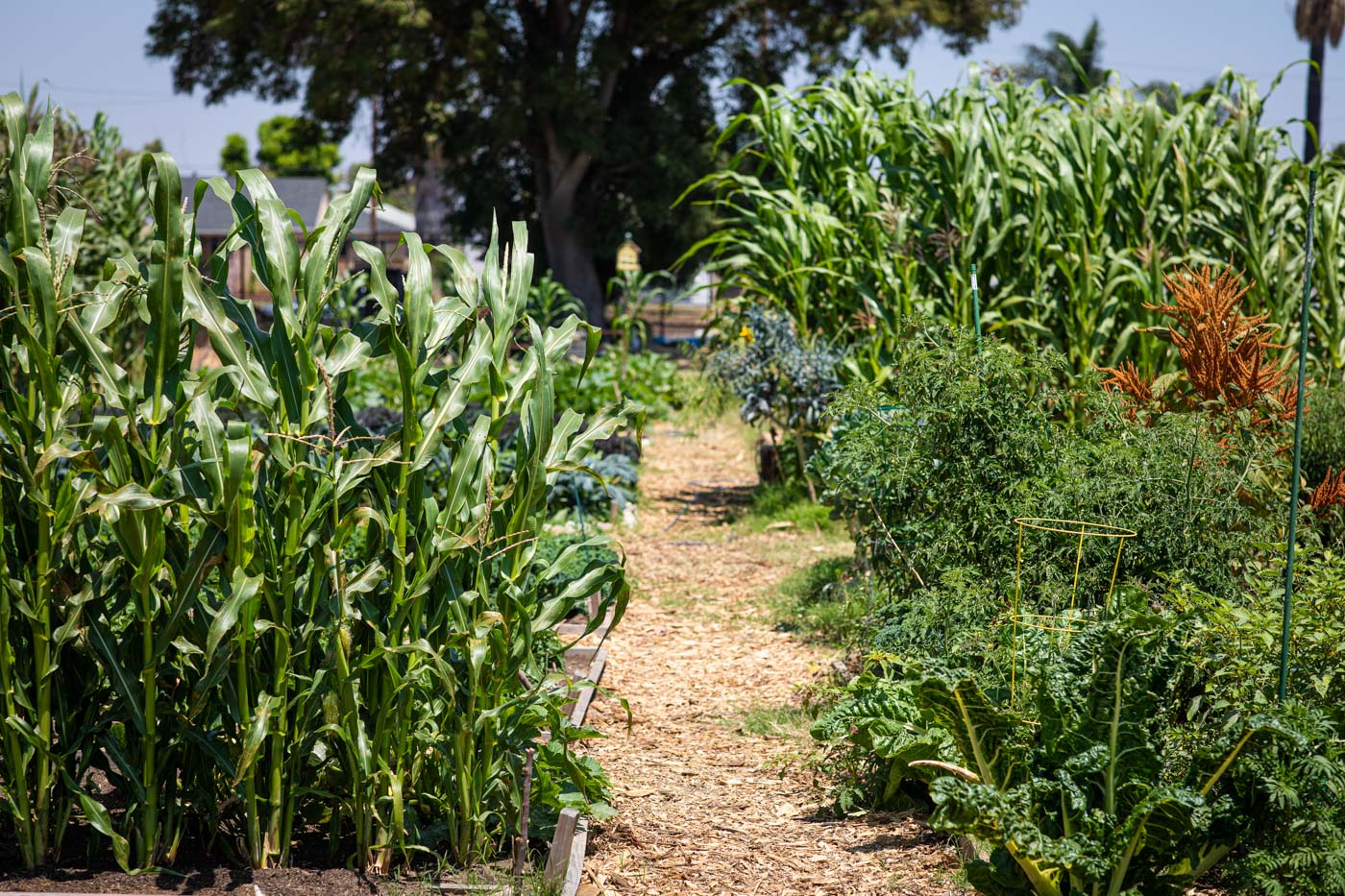
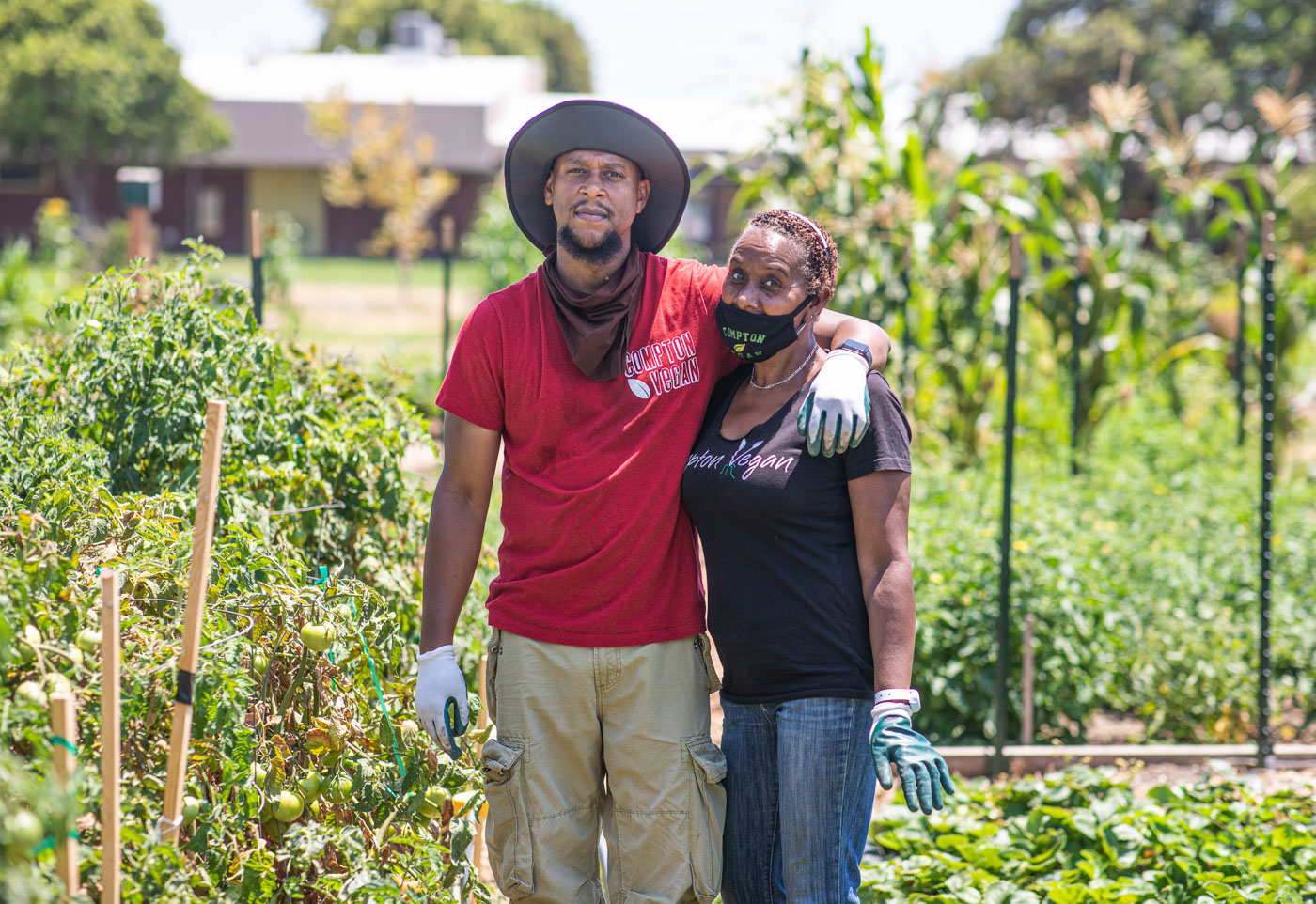
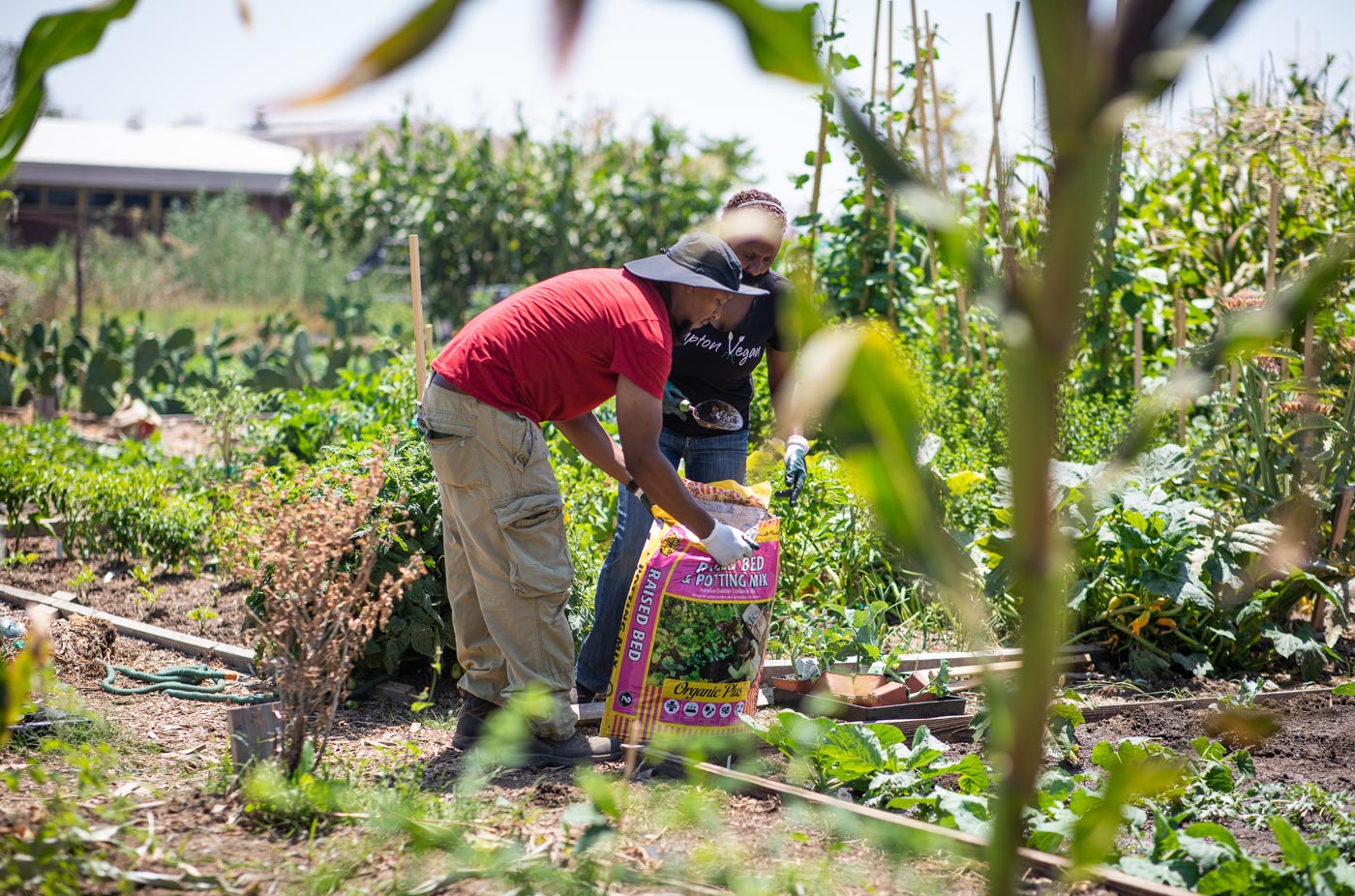
Durrah has a small farm located at his former middle school; it’s his own space to grow what he needs and to learn about agriculture from seed to plate. “I’m trying to get to that point where I’m growing what I need to maintain daily operations,” he tells me. “It’s just a learning process right now, but ultimately, I will be doing farm to table.”
Durrah is connecting to his Compton roots by connecting to roots in the soil. “I plan on having workshops for kids in the community, and showing them the benefits of each particular fruit and vegetable that we have growing in the garden—its nutritional value, its health benefits. And have them doing start-up plants they can take and grow in their own backyards, window sills, or wherever,” he tells me of his plans to invest in education. He wants to teach the community youth about how easy it can be to grow and eat your own food.
Education and early conversation can provide a connection between what is grown from the soil, and what ends up on your plate, and ultimately in your body. This education can lead to a generational shift in quality of life. In fact, Durrah’s investment in his community’s future grabbed the attention of Upfield, who has praised and promoted Durrah for his community leadership, expanding his message through means of their platform.
Upfield launched “A Better Plant-Based Future” advocacy initiative to support stories helping guide the future toward a healthier and sustainable community. Their view is that a plant-based diet can be both healthy and delicious, and it can be the action that helps break a cycle of nutritional injustice.
According to their website: “Plant-based foods are vital to the sustainability of our food system. To positively impact our planet, and the health of future generations, we need to increase awareness and celebrate the benefits of a plant-based diet.” By investing in plant-based community leaders, one can invest in a plant-based future in terms of human and environmental health—and invest in the health of future generations.
___
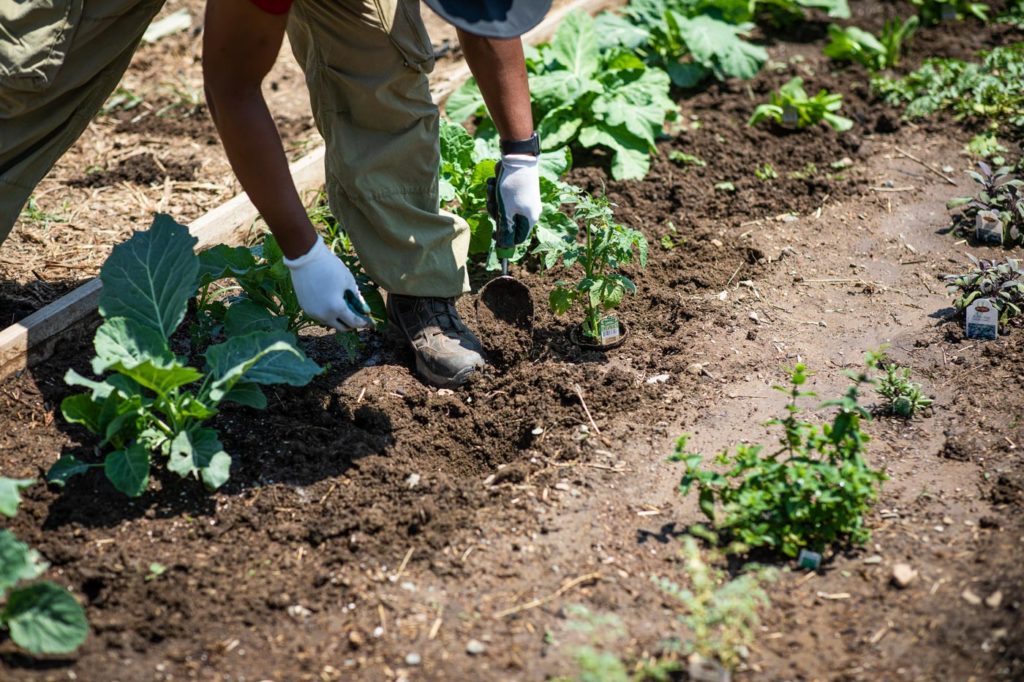
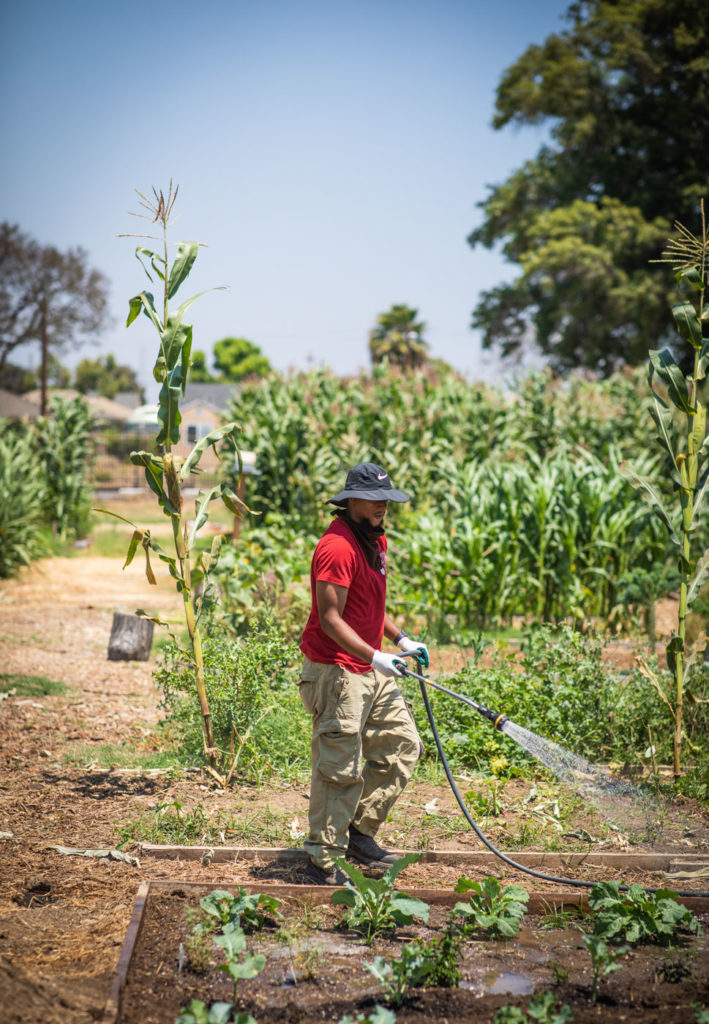
Last month, Durrah wanted to provide sustenance directly to his community. “At a time where unemployment rates were sky-high, and the world was in chaos from Black people standing up for each other, and everybody else joining in on the fight as well, I felt like this was the perfect thing for me to do at the perfect time,” he says. With the Compton Vegan Cares Initiative, Durrah wanted to take something off his neighbors’ plates by putting something on their plates. “I had a lot of contributions from a lot of people who had good in their hearts, and they helped me accomplish the good that was placed in my mind,” he tells me.
Through Compton Vegan, Durrah can expand perceptions of what food can be or taste like. He can educate people on what is taken away from you by what food is put into you.
Durrah attempts every day to live his life with purpose—and this purpose has shaped who he is. “People always ask me, ‘Why am I so positive? Why am I always smiling?’ I wake up every day doing what I want to do,” he says. “And what I want to do isn’t hurting anybody.”
Earlier this year, Durrah was featured in a TEDx Talk where he asks viewers to close their eyes. He says, “No matter what you’re going through, the road to a better you starts today. Because we all have the power to bring our dreams to reality.”
He then asks the viewer to reflect on what their vision is for their own future. He states: “Always remember: you define you.” Durrah is challenging what it means to eat and live in a city like Compton. All change takes is the action of one person planting a seed that just might grow.





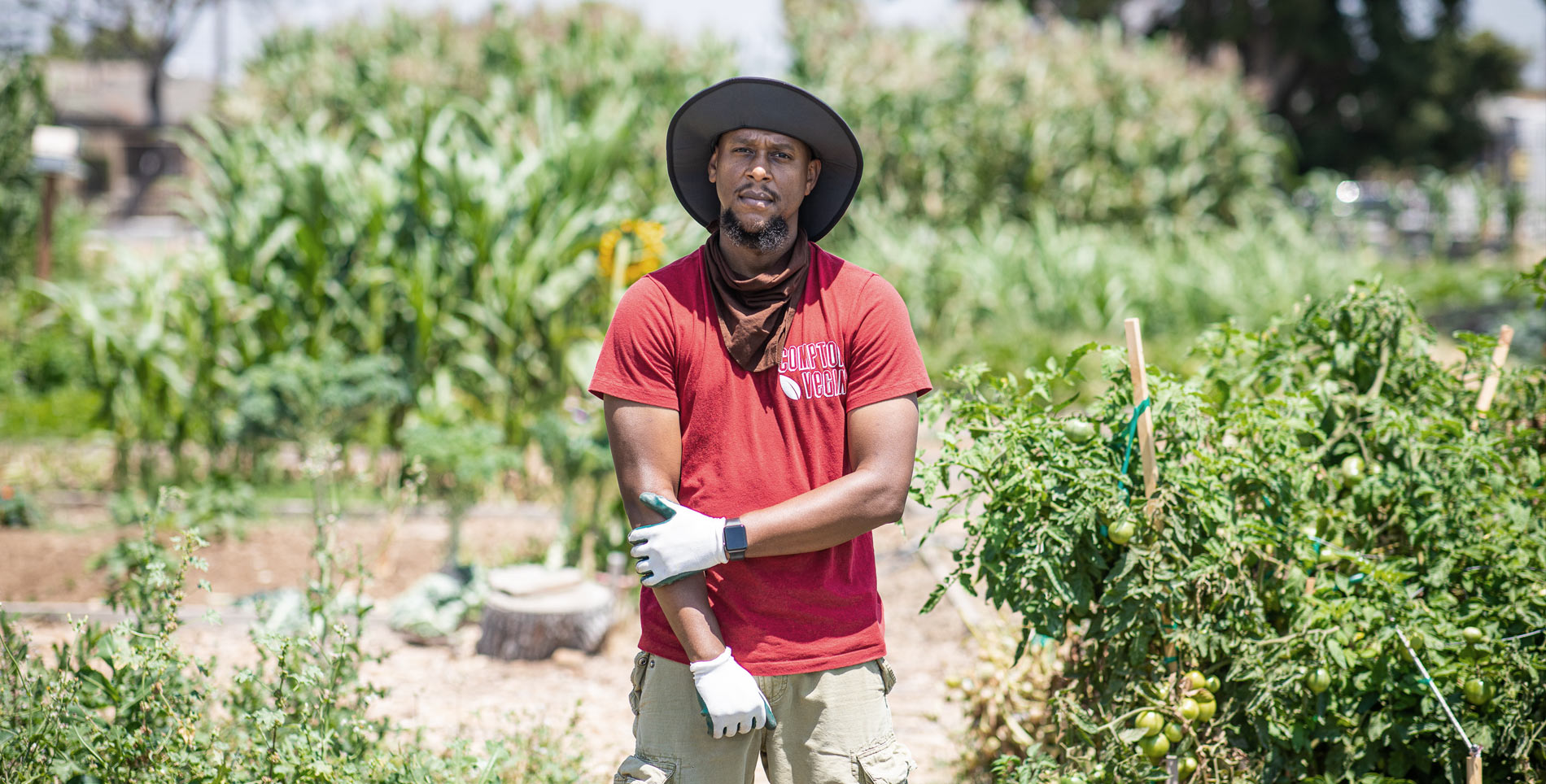
Our comments section is for members only.
Join today to gain exclusive access.